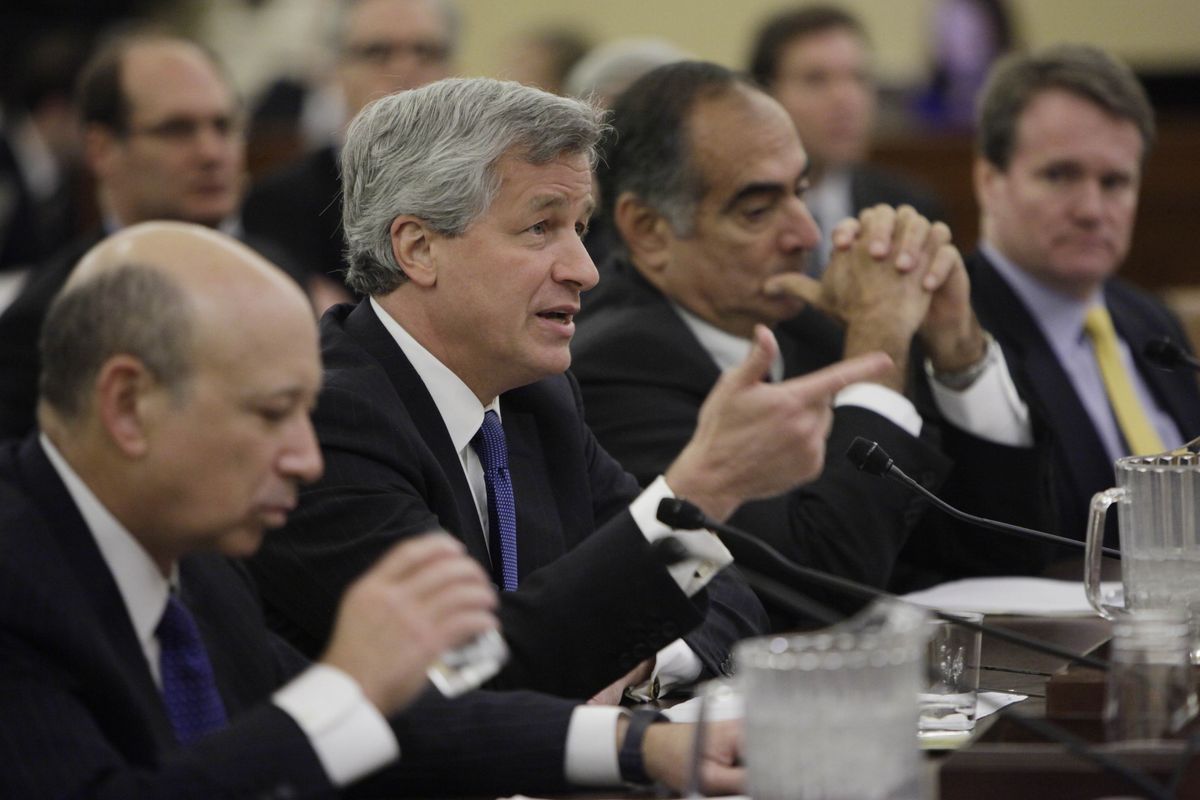Bank CEO gives partial apology
Improper actions led to excessive risk taking, he says

WASHINGTON – Goldman Sachs’ chief acknowledged Wednesday that the investment bank engaged in “improper” behavior in 2006 and 2007 when it made huge bets on a housing downturn while peddling as safe more than $40 billion in securities backed by risky U.S. home loans.
Lloyd Blankfein, Goldman’s chairman and chief executive, made the surprising concession at the opening hearing of the Financial Crisis Inquiry Commission, a 10-member panel that Congress created to investigate and lay out for the public the causes of the worst financial crisis since the Great Depression.
Blankfein and senior officers of three other of the nation’s most prominent banks told the panel that serious flaws in their risk models and business practices contributed to Wall Street’s meltdown and the massive taxpayer bailouts that followed.
Blankfein faced the toughest questioning.
Commission Chairman Phil Angelides, a former California state treasurer, warned Blankfein that he’d be “brutally honest” in his questioning. He asked why Goldman thought it was necessary to take out protection against investment-grade mortgage securities it was selling by purchasing insurance-like contracts known as credit-default swaps. Angelides likened it to selling a car with knowledge it had faulty brakes and then taking out an insurance policy on the buyer.
“I do think the behavior is improper, and we regret … the consequence that people have lost money in it,” Blankfein told Angelides.
Until Wednesday, Goldman had insisted that it was merely managing its risks when it placed “hedges” with insurance giant American International Group and on a private London exchange.
In November, McClatchy Newspapers reported that Goldman failed to tell investors about its contrary bets while selling $39 billion in risky mortgage securities it had issued, and another $18 billion in similar bonds issued by other firms. The Securities and Exchange Commission and Congress are investigating Goldman’s swap dealings, said knowledgeable people who asked not to be identified because of the sensitivity of the issue.
While conceding that its contrary bets were improper, Blankfein said that in most cases Goldman took those positions to offset bets it had underwritten for clients seeking to wager on a housing downturn.
Similarly, he said that the firm got into the business of securitizing subprime loans to marginally qualified buyers on behalf of “sophisticated investors who sought that exposure.”
Angelides, who crusaded for corporate accountability as California treasurer from 1999-2007, pressed Blankfein to explain why Goldman plunged deeper into subprime mortgages despite an FBI warning to Congress in 2004 that the lax lending standards could lead to a crisis. He also needled Blankfein for seeming to resist taking responsibility.
Goldman’s purchase of the dicey loans, Blankfein admitted, allowed subprime mortgage lenders “to go out and originate more loans. So to that extent, we … played a part in making that market.”
After the hearing, Angelides told McClatchy Newspapers that he was “troubled” that Blankfein “never admitted that there was any responsibility of Goldman Sachs to make sure the products themselves were good products.”
All the executives, including JPMorgan Chase Chief Executive Jamie Dimon, Morgan Stanley Chairman John Mack and Bank of America President and Chief Executive Brian Moynihan, acknowledged that they’d paid a huge price for failing to build the possibility of declines in home prices into their risk-management models.
That failure had disastrous consequences, since the banks packaged mortgages into investments that were sold worldwide as securities, often with top ratings from credit-rating agencies such as Moody’s Investors Service. When home prices fell, these securities plummeted in value, the credit agencies’ credibility plunged and distrust over banks’ ability to cover tens of billions of dollars in swap bets created waves of panic that froze financial markets.
The lesson learned is that “given enough time, everything will happen, not can happen,” Blankfein said. He noted that in the aftermath of the housing meltdown his firm models for even the most improbable scenarios in all its lines of business.